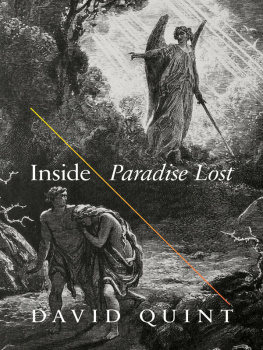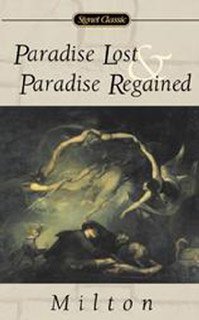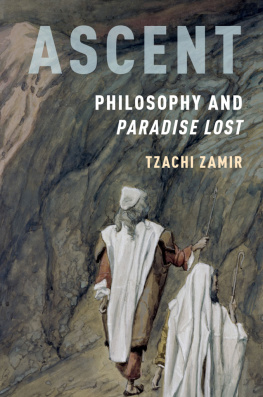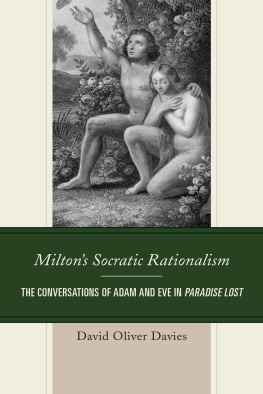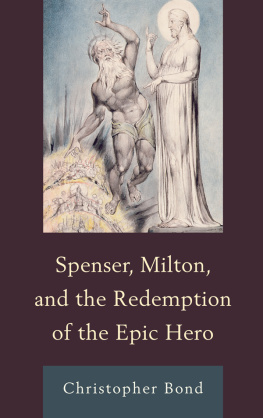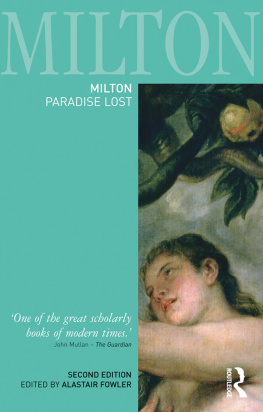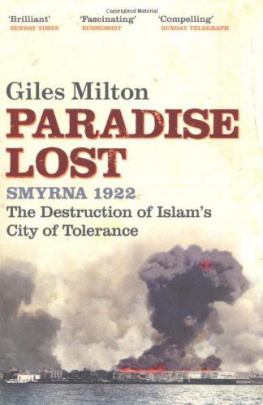
Inside Paradise Lost
Inside Paradise Lost
Reading the Designs of Miltons Epic
David Quint
PRINCETON UNIVERSITY PRESS
Princeton and Oxford
Copyright 2014 by Princeton University Press
Published by Princeton University Press, 41 William Street, Princeton, New Jersey 08540
In the United Kingdom: Princeton University Press, 6 Oxford Street, Woodstock, Oxfordshire OX20 1TW
press.princeton.edu
All Rights Reserved
ISBN 978-0-691-16191-4 (cloth)
ISBN 978-0-691-15974-4 (pbk.)
Library of Congress Control Number: 2013938974
British Library Cataloging-in-Publication Data is available
This book has been composed in Minion Pro
Printed on acid-free paper
Printed in the United States of America
1 2 3 4 5 6 7 8 9 10
FOR JAMES NOHRNBERG
Satan, we would have to say, is the victim of a course in the Bible as Literature.
Nohrnberg, On Literature and the Bible
Contents
Acknowledgments
I have been fortunate to have written this book in the company of many friends and scholars. I thank first of all my Yale University colleagues, a remarkable group of Miltonists to find in one place, and, much more, a group of exceptionally generous and caring people: Lawrence Manley, John Rogers, Annabel Patterson, Leslie Brisman, and Harold Bloom. They have read all or sizable parts of the book, including more than a few of its false starts. I am grateful for their incisive comments and encouragement, for the example of their own scholarship, and, above all, for their friendship. Other Yale friends, David Bromwich and Alexander Welsh, read and criticized the introduction and have helped me to make it more shapely.
Earlier versions of chapters and parts of chapters of this book have appeared in journal articles. They are reused here with the permission of the journals and their publishers. as The Virgilian Coordinates of Paradise Lost, Materiali e discussioni per lanalisi dei testi classici 52 (2004): 17797, copyright Istituti Editoriali e Poligrafici Internazionali, by permission of the publisher. I am grateful to the journal readersI wish to remember the late Richard DuRocherand the journal editors, especially Paul Grendler, Marshall Brown, Glenn W. Most, and Sarah Spence. Their work improved my thought and writing.
I am also indebted to the larger community of Milton scholars in North America. I thank Gordon Braden and Joshua Scodel, who read the manuscript for Princeton University Press and offered me helpful and expert criticism. Charles Stanley Ross invited me to discuss parts of this book at the Newberry Library Romance and Epic Seminar; Regina Schwartz brought me to the Newberry Library Milton Seminar; Paul Stevens asked me to speak to the Canada Milton Seminar; and Jason Rosenblatt arranged for me to present my work at the Northeast Milton Seminar. I thank all four for their friendship and our ongoing conversations about Milton. I have other Miltonist friends to thank for reading earlier versions and more recent drafts. John Leonards criticism was vital to getting this project started; Jason Rosenblatt and Mary Nyquist encouraged me to complete it. Stephen Fallon persuaded me that one of my chapters did indeed need to be reworked and helped me to clarify a different, crucial part of my argument. I have benefited from the comments of Victoria Kahn, Ronald Levao, and Michael Murrin on specific chapters; they are cherished friends. I thank a list of distinguished Miltonists and friends from whom I have been privileged to learn: John Archer, Andrew Barnaby, Carla Baricz, Chimene Bateman, David Currell, Samuel Fallon, Angus Fletcher, Natalka Freeland, Thomas Fulton, Beth Harper, Brad Holden, Blair Hoxby, Andrew Kau, Michael Komorowski, Benjamin LaBreche, Seth Lobis, James Ross Macdonald, Tanya Pollard, Ayesha Ramachandran, Rebecca Rush, Sarah van der Laan, Andrea Walkden, Anthony Welch, and Emily Wilson. I have had the pleasure over the last decade of attending meetings of the Northeast Milton Seminar, and learning from its members: they are too many to list, but I want to mention Joan Bennett, Ann Baynes Coiro, Achsah Guibbory, Dayton Haskin, Laura Knoppers, Barbara Lewalski, Thomas Luxon, Nicholas von Maltzahn, Stella Revard, William Shullenberger, Nigel Smith, Gordon Teskey, and the late Marshall Grossman. As this book was nearing completion, my thinking was enriched by Samuel Bendinelli, Radhika Koul, Drisana Misra, Ryan Pollock, Michael Rose, Maria Alexandra van Nievelt, Alex Werrell, and Madeline Wong. I thank Carla Baricz, who formatted the bibliography and assisted me in preparing the manuscript for publication. I am grateful for the work of my copyeditor, Cathy Slovensky, and to Ellen Foos and Alison MacKeen at Princeton University Press.
This book is dedicated to James Nohrnberg, my teacher and friend.
Inside Paradise Lost
Introduction
The message of Paradise Lost is: make love, not war. The poem that pretends to begin the epic tradition by retelling events that preceded those of all earlier epics would also end the epic genre by condemning its traditional subject matters, war and empire. The central human heroic act of the poem is Adams choosing love for Eve, his wife and fellow human being, over obedience to God. In making us think twice at all about this choice, in appearing even to ratify it, Paradise Lost revises its biblical subject matter just as radically as it revises epic. The Fall is fortunate not only because it allows the Son of God to offer himself to save humanity, but because it already anticipates the supersession of the Law by the Love and Liberty the Son will bring about by his example. Its obverse in the poem is Satans envious lust for power, his institution of monarchy in hell, and his readiness to enslave others. The Milton of Paradise Lost is a Christian humanist: his Christianity emphasizes the true empowerment of men and women as free moral agents.
These are the broad outlines of my reading of Paradise Lost, more and less familiar. In the broadest sense my argument has been anticipated by many commentators. Miltons God, however, is in the details, and this book goes inside the epic by examining some of its intricacies: how verbal design and allusive conceit together shape its units of meaning. These are poems within the poem. The generic expectations of Renaissance epic that looked back to the model of the Aeneid required Paradise Lost to maintain over its vast length not only the loftiness of the high style but the semantic density and unity of a lyric. For this reason, few great epics like Miltons were achieved, though many were attempted. This kind of epic was also expected to contain studied allusion in almost every verse, as Virgil was known to have imitated Homer, the Greek tragedians, and his own predecessors in Latin poetry. These expectations for the writer of the epic create expectations for the epics reader, who will hold in his or her memory word-patterns that form and repeat themselves through the course of the entire poem: the rustling wings of the fallen angels in hell in book 1 make a hiss (1.768) that already anticipates their final transformation nine books later into hissing serpents in book 10. The reader will also be responsive
The studies of Paradise Lost in this book show what such assembly can reveal about the poetic texture and pleasure of Miltons epic. They uncover verbal arrangements and thought structures that bind togetherin widening configurationsepisodes, individual books, motifs that run through the larger poem, and motifs running through Miltons still larger career. In many instances, I show how these designs are built
Next page
